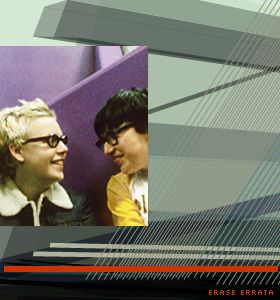Wednesday, February 18, 2026 |
||

ERASE ERRATA'S POST-RIOT GRRRL, POST-FEMINIST POST-PUNK // The Bay Area quartet creates a new kind of noise. |
|
| Interview Jenny Tatone Photography Jim McGinnis | |

Bianca Sparta (left) and Jenny Hoysten "We all really try and explore a whole lot of different kinds of music, and I think that keeps us fresh, so that we're always bringing something new." — Jenny Hoysten |
Tatone: Could we evolve in a more positive way without it?
Erickson: I think you have to incorporate it into your life and decide how you wanna live. Nothing forces you to do anything. Tatone: I like the song "Fault List." It seems to question the habitual placement of responsibility and where to look when things go bad. Could you talk about writing this song and what it means to you? Hoysten: I need to think about that song for a second [head in hands, rubbing eyes and forehead]. That song is about a couple of things. It's a little more personal than a social commentary, except for the end is an exposé on the Freemasons and the secrets that we believe they're hiding. The beginning is actually a little bit more personally about what was going on in my life. I was playing in a bunch of bands and getting a little overwhelmed with all the music that was going on, and feeling like I was neglecting other things in my life, like eating and stuff, for awhile. It's a metaphor for me putting my guitar away for a year and going underground a little bit. I generally try to double-reference as much as I can, so there are a lot of other things that are implied. In general, the theme of that song was just about me trying to conjure myself down from getting too excited about all the projects I was doing. Tatone: Did you actually do that? Hoysten: Yeah. Tatone: Do you write all the words? Hoysten: There's one song these two girls [pointing to Jaffe and Sparta] helped me with. One song, "Walk, Don't Play" — wait, did you help too [to Erickson]? We probably all wrote it. That was in response to an incident we had at the airport, flying. We went out to record in Michigan, where we recorded our album with my friends, and they lost Sara's guitar on the airline. It was a really frustrating experience, and that's where another technology blow-up was the case. Tatone: Did they find your guitar? Jaffe: Yeah, after the recording. And then it got stolen two months later anyway. Hoysten: We recorded at a really great analog studio [X Pulsar] — one of the best in the country. It's in Owosso, Mich. And these two guys, Colin [Dupuis] and Norm [Druce], have an amazing set-up. It's like they're students of Steve Albini [legendary Chicago post-rock producer known for his work with Nirvana, The Breeders and PJ Harvey] where they're really not into post-production at all. They do everything with microphones, so it was a really interesting experience. They're really resourceful — that was a really neat thing, it really contributed to the sound of the record. They're amazing geniuses, and they're out in the middle of nowhere. Tatone: Could you talk about the song "Billy Mummy"? Hoysten: It's not about Add [Attention Deficit Disorder]. All these people keep saying it's about ADD. I dunno who came up with that, but they wrote it down somewhere and everyone else read it and thought it was gospel. Yeah, that song changes from time to time. I direct it at people who are in power in our national government. But it's definitely loosely based on the Twilight Zone episode "The Billy Mumy Star." I wanted to sound more like a monster. It's this thing where this kid has the power to decide if you're doing something right or wrong and make you disappear into the cornfields or wherever he sent you. Tatone: Could you talk about the song "How to Tell Yourself From A Television"? Hoysten: Which one is that [to Erickson]? We have different names for a lot of our songs. Do you wanna know something about it specifically? |